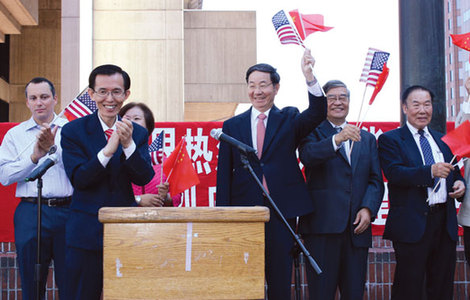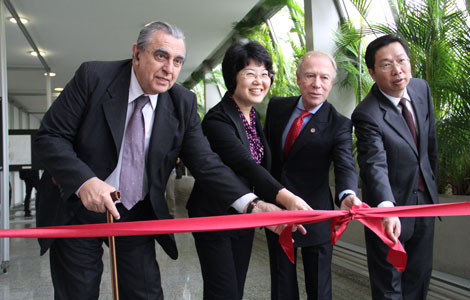Software creates a smart world
Updated: 2014-09-29 12:08
By Lian Zi in San Francisco(China Daily USA)
|
||||||||
Technology and business pioneers from both China and the US gathered at the SVCWireless annual conference to share thoughts on innovations in cutting edge technology.
Internet of Things (IoT), wearable devices and smart world are three hottest areas most people are talking about these days, said Huang Qiming, secretary and board director of SVCWireless.
Software has already created a "smart" world, according to the panelists.
"In the smart world, when you go to a restaurant or a Starbucks, you don't need to read the menu and order yourself. Our system based on lots of censors on your smartphone can automatically detect what you are doing, what you have been doing, and try to predict what you are going to do in the future," said Sam Liang, vice-president of Technologies at Autonavi.
Panelists acknowledged the importance of software development in terms of changing people's lives.
"In the smart world, anything that can be sensed will be sensed, anything that can be connected will be connected," said Liang.
Sensors can track users' behaviors and locations, so as to generate big data for analysis. The results of analysis could then be applied to services sectors to raise the efficiency of business operations, said Tom Quinlan, a partner at ReedSmith.
From the experts' perspective, China plays a major role in creating the smart world by bringing in different solutions to the technology application, said Lucis Gradinariu, chief architect of Huawei.
With lots of the newest technology brought into Chinese market, China's healthcare industry will experience a large growth in the next five years, predicted Song Xulan, a partner of Hejun Group.
Song also outlines the directions for future development of healthcare services in China by comparing the differences between the investment ecosystems in China and US. "In US, health management takes 28 percent of the whole health market. However, in China, it only takes 4.5 percent of the market, which creates a huge profit potential for young enterprises to fill the gap."
(China Daily USA 09/29/2014 page2)
Most Viewed
Editor's Picks

|

|

|

|

|

|
Today's Top News
China thanks foreign talent for contributions
Top venture capitalists meet in Silicon Valley
China, US should cooperate in energy: experts
15 people, mostly teens, shot at Miami nightclub
Currency swap potential boon to Argentia
Sino-Venezuela ties at 'highest level'
FM makes official visit to Mexico
Brazil, China exchanges ink deal
US Weekly

|

|















